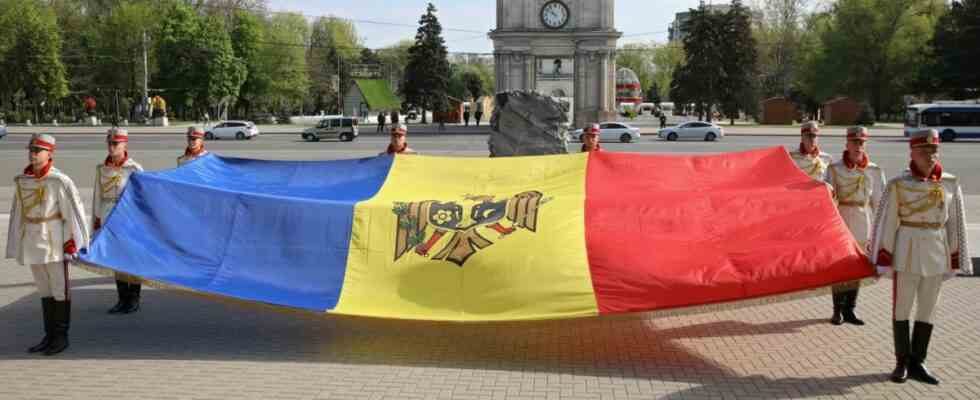In the Republic of Moldova, the guesswork continues over several attacks in and around the separatist region of Transnistria. At the beginning of the week, the state security building in the pro-Russian part of the country, which had split off politically thirty years ago, was damaged by shells, and a day later two transmission masts were blown up. A day later, a huge army camp in Cobasna in northern Transnistria, believed to contain up to 20,000 tons of ammunition, was said to have been attacked. In the meantime, however, it is said from the region that the shelling did not hit Cobasna, but only a target in Ukraine a few kilometers away.
Whoever wanted to use these attacks to cause uncertainty has achieved their goal: fears of being drawn into Russia’s war against Ukraine are growing, and not just in the self-proclaimed “Transnistrian Moldovan Republic”, which is dominated and dependent on Russia.
Uncertainty is also increasing in the Republic of Moldova. From Tiraspol, the separatist capital, it is reported that all men of military age are not allowed to leave the region; At the same time, Vitaliy Ignatiev, “Foreign Minister” of the Transnistrian Republic, which Moscow does not even recognize under international law, emphasizes to the international media that they are “solely committed to peace and the security of all people who live in Transnistria”. The army is “defensively oriented” and there are “no plans of attack” against anyone.
In the would-be state, which officially longs for recognition by Russia but at the same time is increasingly orienting itself economically towards Europe, many citizens are afraid of the war in the immediate vicinity. According to unconfirmed reports from Tiraspol, queues of cars are said to be building up at the crossings to Moldova. In Moldova’s capital, Chişinău, there is at least as concern that a spiral of violence could develop from the unexplained attacks of the past few days, which are sometimes attributed to Ukrainian saboteurs, sometimes to the Russian secret service, but sometimes also to Transnistrian forces themselves.
Bulgaria and Israel advise their citizens to leave Moldova
Moldova, a former Soviet republic that now has close ties to Romania – and a few weeks ago submitted an application for EU membership, has long been considered a possible target of Russian aggression. However, given the current military situation, it is unlikely that the Russian army could advance to the extreme west of Ukraine and attempt an attack on Moldova, even if supported by troops from Transnistria. According to Moldovan experts, this is a worst-case scenario, which is not expected in view of the recent setbacks for Russia.
All reports and background information on the war in Ukraine – in the SZ in the morning and in the SZ in the evening. Our news–Newsletter brings you up to date twice a day. Free registration at sz.de/morgenabend. In our news app (download here) you can also subscribe to the news newsletter or our breaking news as a push message.
The non-NATO government of Moldova has nonetheless expressed concern that it has only 6,000 soldiers and an extremely poorly equipped army that cannot defend the country. Reports that Romania was sending military convoys to the Moldovan border have been dismissed.
In the meantime, the European Union has also taken a stance on an imminent escalation of the conflict in Moldova. Brussels called on all parties involved to show restraint. Joseph Borrell, EU High Representative for Foreign Affairs and Security Policy, named the recent events in Transnistria “harmful to security and stability”. According to the Deputy Commissioner, the EU is in solidarity with the Republic and its claim to sovereignty and territorial integrity.
In Chişinău, this is read as a clear signal to Russia, where a high-ranking military officer recently speculated about a land corridor and thus a possible expansion of the conflict to Transnistria. However, some states, including Bulgaria and Israel, have advised their citizens to leave Moldova. The website of the Federal Foreign Office also advises against traveling to Transnistria, with reference to the security situation, which has deteriorated. However, Tiraspol is currently hardly issuing any visas anyway.
Meanwhile, while the Moldovan government appears keen to ease tensions and stay in touch with the Transnistrian leadership, efforts to move closer to the EU continue. According to the expert on Russian foreign policy at Oxford University, Samuel Ramani, Chişinău has decided to demonstratively support the EU sanctions against Moscow, which had previously been rejected with reference to the precarious dependence on Russian gas and electricity.

